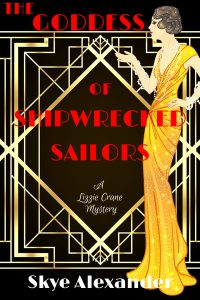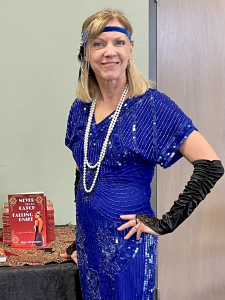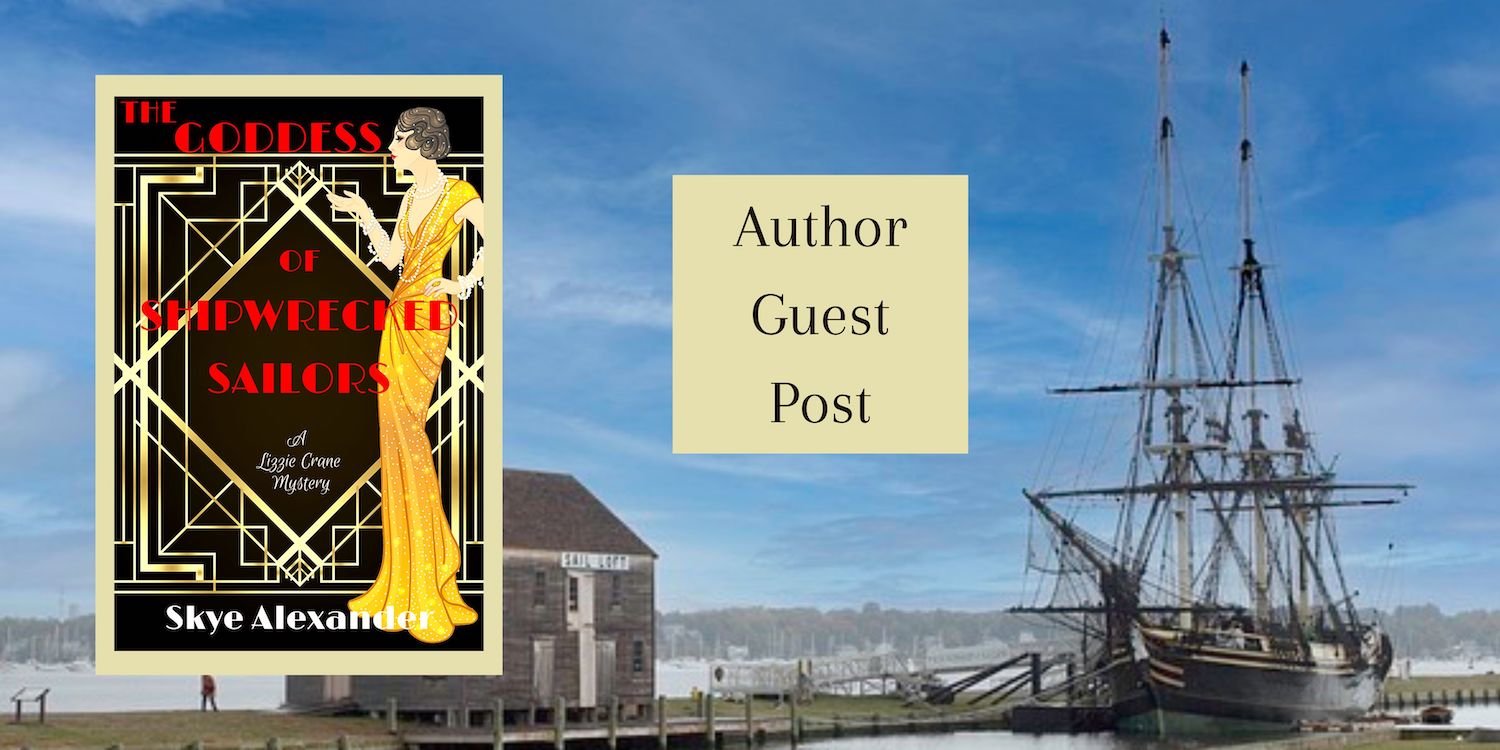The Goddess of Shipwrecked Sailors: A Lizzie Crane Mystery by Skye Alexander
Guest Post + Book & Author Info
Find new authors! Author interviews, click the link here.
The Goddess of Shipwrecked Sailors

December 1925: Salem, Massachusetts
When Matthew Gardner, the heir to a shipping fortune, hires New York jazz singer Lizzie Crane and her band to perform during the Christmas holidays, she has high hopes that this prestigious event will foster their career and bring them riches and recognition. She’s also eager to reconnect with a handsome man from one of Boston’s most esteemed families, whom she met at an earlier visit to Massachusetts.
But the evening the musicians arrive in historic Salem to begin their engagement, police discover the body of a man near a tavern owned by Lizzie’s cousin–a cousin she even didn’t know she had until Christmas Eve. In the dead man’s pocket is a cryptic letter addressed to Gardner. To compound her dismay, she also learns that her host plans to marry his daughter to the man Lizzie wants for herself.
Soon Lizzie’s caught in the middle of a high-stakes feud between her cousin and her employer over a mysterious lady. When she digs deeper into their conflict, she discovers its roots are deep and bitter: her cousin’s father crewed on one of Gardner’s grandfather’s ships that sunk during a storm in 1868. As she struggles to piece together the puzzle and find the lady at its center, Lizzie becomes a pawn in each man’s deadly game for money and revenge.
To purchase The Goddess of Shipwrecked Sailors click on the following links: Amazon, Barnes and Noble
Guest post from Skye Alexander, Author of The Goddess of Shipwrecked Sailors
Where Do Characters Come From?
by Skye Alexander
Do writers create our characters or do our characters find us? Are they the children of our minds or do they exist independent of us, somewhere in the ethers, like spirits searching for host mothers to give them life on earth? When the time is right, when they spot an opportunity, do characters slip into our consciousness and reveal themselves to us? Even after decades of writing, I still don’t know the answers to these questions.
Writers have intense and intimate connections with our characters. For many of us, the characters in our books are every bit as real as the flesh-and-blood people we interact with on a daily basis. We know more about them than we know about our spouses, our siblings, our friends. We think about them even when we’re not actually writing. Our characters talk to us when we’re taking a shower, walking in a park, shopping for groceries, and trying to sleep. They ride along with us when we’re commuting to work. They offer advice on cooking or fashion or how to handle our kids––whether or not we asked for it. They latch onto us and won’t let go. They become our constant companions (and yes, we even have a certain fondness for the bad guys). Being a writer gives us license to have imaginary friends, so if you notice us talking to ourselves, we’re not nuts. We’re simply conversing with our BFFs or testing out a bit of dialogue.
People often ask me where my characters come from. Occasionally, a reader insists he or she is someone I’ve written about in one of my books. I refer you folks to the disclaimer at the beginning of each novel that says something to the effect of: “This is a work of fiction. Except in the case of historic fact, any resemblance to actual persons, living or dead, is purely coincidental.”
That doesn’t mean we writers won’t appropriate a particular tidbit we find intriguing, such as your $3,000 custom-made cowboy boots, or that port-wine birthmark in the shape of New Jersey on your thigh, or your habit of clapping your hands three times and circling widdershins before entering your mother-in-law’s house. Warning: Writers are thieves, so don’t do or tell us anything really cool unless you’re okay with it appearing in print. But no, we don’t usually reproduce the ordinary people we know in our novels––unless we’re trying to reap vengeance, but that’s another story.
Fictional characters want to tell their tales and make their marks in the literary world. Sometimes I give a character a bit part and she pushes her way into a starring role. Writers tend to fall in love with our characters. We don’t want to say goodbye when a book ends, so we write a series. Agatha Christie’s Detective Hercule Poirot starred in thirty-three novels, fifty-nine short stories, and one full-length play. Naturally, the protagonist appears in every book in the series, but often subordinate or even minor characters turn up again and again, especially if the stories occur in a particular place, such as Louise Penny’s fictional town Three Pines.
In my Lizzie Crane mystery series, which is set in the mid-1920s, I invite a few historical figures to play cameos. This gives a period feeling to the novels, adds a splash of color, and in some cases furthers the plot. However, these real-life people are presented in a fictitious manner. The artist Edward Hopper comes to a party in the third book in my series The Goddess of Shipwrecked Sailors (released in September 2023). In the fourth novel (Running in the Shadows), Charles Lindbergh performs a daredevil aerial show. In my books, these famous folks do things they really did––yes, Lindbergh was a barnstorming stunt pilot before he flew across the Atlantic and into history books. But, of course, they never actually met my characters (at least, not to my knowledge).
Characters drive stories, they’re not just along for the ride. If we don’t connect with the characters in a novel, we probably won’t read more than a couple chapters. If we really, really like them, we’ll follow them wherever they go. They take us to places and time periods we might never know about otherwise. They present us with ideas and situations we might never have considered before. They teach us about courage, compassion, patience, strength, humility, tragedy, and triumph. They help us understand ourselves and the people we know better. By sharing their journeys with us, characters in books reveal to us the vastness of the human experience with all its complexity, richness, and magic.
Skye Alexander — Author of The Goddess of Shipwrecked Sailors
 Skye is the author of more than 40 fiction and nonfiction books, many on metaphysical and spiritual subjects.
Skye is the author of more than 40 fiction and nonfiction books, many on metaphysical and spiritual subjects.
Her stories have been published in numerous anthologies internationally, and her work has been translated into more than a dozen languages.
Her Modern Guide to Witchcraft has sold more than 100,000 copies, ranked #10 in magic studies on Amazon, and has over 2,000 positive Amazon reviews.
In August 2021, her new mystery series set in 1925 and featuring jazz singer Lizzie Crane debuted. Skye is also an artist, writing teacher, feng shui practitioner, astrologer, and tarot reader. She divides her time between Texas and Massachusetts.
To learn more about Skye, follow her on her website.
Elena Taylor/Elena Hartwell

Header Image by robert mcclurg from Pixabay




